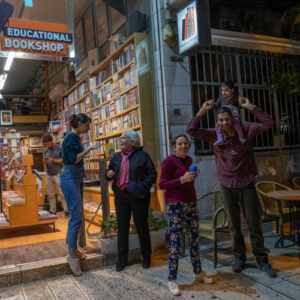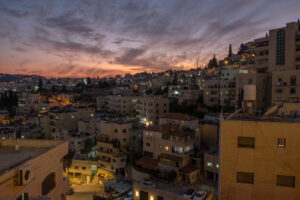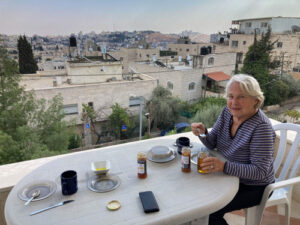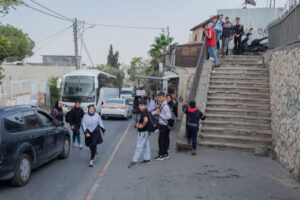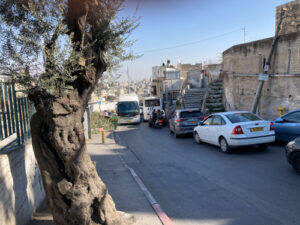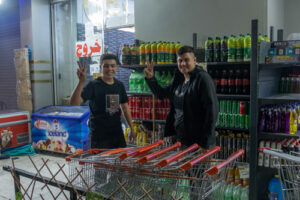Dear Reader, Chers lecteur (texte en français, traduit par DeepL, à la suit des photos),
En 2014 I started out on a project to prepare a book on Palestinian theaters with a group of Palestinian actors. Seven years later, in December 2021, “Acting Out: Voices from the Theatre in Palestine” was published in East Jerusalem, and the French version, “Voix du théâtre en Palestine” was published in Paris. Little did I suspect how life-changing this project would be and how important the book would be to Palestinians. After my second visit to Palestine in 2016 to interview Palestinian theatre people and take photos, I decided not to return until the book was finished. That moment came a year after publication, in November 2022. What follows is an after-the-fact journal of my observations, feelings, and analysis of three extraordinary weeks in the heart of human experience as we reconnected with what had become old friends and familiar places.
This was first posted on Facebook with the following introductory words:
It has been 6 weeks since I last posted on FB. Now, as 2022 comes to a dismal end, and we face 2023 with justified anxiety, I am driven to write and to return to FB. Events in Palestine overtake us. Since our return, there have been increased attacks on Palestinians by Zionist settlers in Hebron, several Palestinian youths have been killed by Israeli forces in Ramallah, East Jerusalem and Hebron, the Franco-Palestinian lawyer, Salah Hamouri has been expelled from Palestine, home to his family, after several 6 month-long “administrative” detentions (imprisonments), and there is the “new” Netanyahu right-wing government in Israel, just to mention the most dramatic events. So, although my personal experiences seem inconsequential in the face of the increasingly violent Israeli occupation of Palestine, I wish to share them with you.
On arriving in Palestine, I was unexpectedly overwhelmed with emotion. Each movement, each encounter was loaded with memories or new sensations, like a fast-moving kaleidoscope. Trying to put the spontaneous emotional impressions into a coherent Cartesian whole was impossible. I made several attempts to write posts, but none got past a few sentences. Now, here in the bucolic French countryside, the words have finally come to me. As in a film where the action and the sound are not synchronised, here is my account of events and feelings, days after the action.
Home Again
What was it about Palestine? Why was I so taken by it? In the heat of the moment, I felt like a child, giddy from the stimuli which bombard me and destabilised me. It was in Hebron, a week after we had arrived that I began to understand my unease: the contrast between the warmth of old friends and easy human contact with strangers, and the dreadful context of a violent occupation which has become a vicious and sinister apartheid. It is indeed disturbing to be at once so at ease, so comfortable in the middle of one of contemporary history’s most socially and personally destructive environments.
After being whisked out of the Ben Gurion airport, across the 48 (see below), and into the maze of Jerusalem streets and the traffic (which magically never freezes up) we arrived at our lodgings in the Ras Al-Amud neighbourhood southeast of the Old City, next to the Mount of Olives. It is the family compound of Mahmoud Muna of the Educational Bookshop, the publisher of “Acting Out.” It is a complex of 9 apartments in 3 interconnected buildings housing 50 members of the Muna family; parents, 4 brothers, each with an apartment, numerous grandchildren, some old enough to have their own apartment, and lots of great-grandchildren.
The emotions which our return to Palestine after an absence of 6 years has produced are indescribable. I am drunk with happiness. So much so that I think that even strangers are equally pleased to see me. I talk with everyone: kids on the street, shopkeepers, other customers, passers-by, anybody who looks like he (more rarely she) could be in friendly agreement with my enthusiasm.
And here in Palestine it works! I don’t want to be naive; the occupation and the distorted vision of Palestinians as a collectively dangerous, if not terrorist people which its propaganda and the mainstream media has produced, has succeeded in reducing the numbers of foreign visitors to a minimum. So, any “internationals” (visitors from outside the Middle East) like us are more than welcome, especially if we express genuine solidarity with Palestinians and their struggles. But beyond this there persists a culture of openness in Palestine, a welcoming of strangers, and a respect for the “other” which our contemporary individualist ideology in Western societies is rapidly destroying.
Some examples:
The streets here are very narrow, and sidewalks, if they exist, are more for trash bins and parking than for walking. The dead-end street where we are staying joins a very steep and narrow main road, and when we went out for our first walk, a taxi driver was trying to park as close to a wall as possible. I gave him some hand signals to help, and when he was parked, he opened his window to say thanks. He could tell that we were visitors, so he asked where we were from and welcomed us, offering his services obviously as a businessman, but also with a genuine concern that we be cared for and that we get a positive view of his country.
On the busses and collective taxis, which we often took, we were easily identified as internationals. That, along with our age, gave us a special status, and we were constantly afforded extreme politeness and concern. In crowded busses places were given up to us, people watched to make sure that we got off at the right stop, and that we didn’t forget anything. People weren’t just being polite; they were taking care of us.
Stores, even the super-markets are more than commercial enterprises, they are community centers, aid stations, communication hubs and friendly meeting places. And there is always someone, a customer or employee, who can speak English and is only too happy to help. What would normally be a simple transaction becomes a socio-political discussion; where are you from, why are you here, how do you like it? Of course, our political sympathies go a long way in creating an authentic desire to help. And help we get, from advice on products, to prices and even in “negotiations.” On one occasion, two stock boys saw me standing outside their store waiting for Marie-Renée. They brought two crates for a seat and gestured for me to sit down.
“Welcome to Palestine!”, which we constantly heard, is not just a saying.
Note on the “48”
Under the Israeli occupation, Palestine has no direct transportation links to the outside world, no airports and no boat, train or bus service. To reach Palestine from any international origin one is obliged to pass through the “48.” Like many Palestinians I call Israel the 48 because in 1948 the territory which Zionists claimed for the self-proclaimed state was universally considered to be part of Palestinian territory, even if there was no official state on the land. I am not denying the existence of Israel, I am only keeping clear the nature of that existence, and the price which Palestinians have had to pay for it.
Texte en français :
En 2014, je me suis lancé dans un projet de préparation d’un livre sur les théâtres palestiniens avec un groupe d’acteurs palestiniens. Sept ans plus tard, en décembre 2021, “Acting Out : Voices from the Theatre in Palestine” a été publié à Jérusalem-Est, et la version française, “Voix du théâtre en Palestine” a été publiée à Paris. J’étais loin de me douter à quel point ce projet allait changer ma vie et à quel point ce livre serait important pour les Palestiniens. Après ma deuxième visite en Palestine en 2016 pour interviewer des gens de théâtre palestiniens et prendre des photos, j’ai décidé de ne pas revenir avant que le livre ne soit terminé. Ce moment est arrivé un an après la publication, en novembre 2022. Ce qui suit est un journal après coup de mes observations, sentiments et analyses de trois semaines extraordinaires au cœur de l’expérience humaine, alors que nous renouions avec ce qui était devenu de vieux amis et des lieux familiers.
Ce texte a d’abord été publié sur Facebook avec les mots d’introduction suivants :
Les événements en Palestine nous dépassent. Depuis notre retour, les attaques contre des Palestiniens par des colons sionistes se sont multipliées à Hébron, plusieurs jeunes Palestiniens ont été tués par les forces israéliennes à Ramallah, Jérusalem-Est et Hébron, l’avocat franco-palestinien Salah Hamouri a été expulsé de Palestine, où se trouve sa famille, après plusieurs détentions “administratives” (emprisonnements) de 6 mois, et il y a le “nouveau” gouvernement de droite de Netanyahu en Israël, pour ne citer que les événements les plus dramatiques. Aussi, bien que mes expériences personnelles semblent sans importance face à l’occupation israélienne de plus en plus violente de la Palestine, je souhaite les partager avec vous.
En arrivant en Palestine, j’ai été, de manière inattendue, submergé par l’émotion. Chaque mouvement, chaque rencontre était chargée de souvenirs ou de nouvelles sensations, comme un kaléidoscope en mouvement rapide. Il était impossible d’essayer de mettre ces impressions émotionnelles spontanées dans un ensemble cartésien cohérent. J’ai fait plusieurs tentatives pour écrire des billets, mais aucune n’a dépassé quelques phrases. Maintenant, ici, dans la campagne française bucolique, les mots me sont enfin venus. Comme dans un film où l’action et le son ne sont pas synchronisés, voici mon récit des événements et des sentiments, quelques jours après l’action.
De retour à la maison
Qu’est-ce que c’était que la Palestine ? Pourquoi ai-je été si touché par ce pays ? Dans le feu de l’action, je me sentais comme un enfant, étourdi par les stimuli qui me bombardaient et me déstabilisaient. C’est à Hébron, une semaine après notre arrivée, que j’ai commencé à comprendre mon malaise : le contraste entre la chaleur des vieux amis et le contact humain facile avec les étrangers, et le contexte épouvantable d’une occupation violente qui est devenue un apartheid vicieux et sinistre. Il est en effet troublant d’être à la fois si à l’aise, si confortable au milieu de l’un des environnements les plus destructeurs de l’histoire contemporaine sur le plan social et personnel.
Après avoir quitté l’aéroport Ben Gurion, traversé la 48 (voir ci-dessous), et être entrés dans le dédale des rues de Jérusalem et de la circulation (qui, comme par magie, ne s’arrête jamais), nous sommes arrivés à notre logement dans le quartier de Ras Al-Amud, au sud-est de la vieille ville, à côté du Mont des Oliviers. Il s’agit de la propriété familiale de Mahmoud Muna, de la librairie éducative, l’éditeur de “Acting Out”. Il s’agit d’un complexe de 9 appartements dans 3 bâtiments reliés entre eux, où vivent 50 membres de la famille Muna : les parents, 4 frères, chacun ayant un appartement, de nombreux petits-enfants, certains assez âgés pour avoir leur propre appartement, et beaucoup d’arrière-petits-enfants.
Les émotions que notre retour en Palestine après une absence de 6 ans a produites sont indescriptibles. Je suis ivre de bonheur. A tel point que je pense que même les inconnus sont aussi heureux de me voir. Je parle avec tout le monde : les enfants dans la rue, les commerçants, les autres clients, les passants, tous ceux qui ont l’air de pouvoir être en accord amical avec mon enthousiasme.
Et ici, en Palestine, ça marche ! Je ne veux pas être naïf ; l’occupation et la vision déformée des Palestiniens comme un peuple collectivement dangereux, sinon terroriste, que sa propagande et les médias grand public ont produit, ont réussi à réduire au minimum le nombre de visiteurs étrangers. Ainsi, tous les “internationaux” (visiteurs de l’extérieur du Moyen-Orient) comme nous sont plus que bienvenus, surtout si nous exprimons une véritable solidarité avec les Palestiniens et leurs luttes. Mais au-delà de cela, il persiste en Palestine une culture d’ouverture, d’accueil de l’étranger et de respect de “l’autre” que l’idéologie individualiste contemporaine des sociétés occidentales détruit rapidement.
Quelques exemples :
Les rues ici sont très étroites, et les trottoirs, s’ils existent, servent plus de poubelles et de parking que de lieu de promenade. La rue sans issue où nous logeons rejoint une route principale très raide et étroite, et lorsque nous sommes sortis pour notre première promenade, un chauffeur de taxi essayait de se garer le plus près possible d’un mur. Je lui ai fait quelques signes de la main pour l’aider et, une fois garé, il a ouvert sa fenêtre pour nous remercier. Il savait que nous étions des visiteurs, alors il nous a demandé d’où nous venions et nous a accueillis, offrant ses services, évidemment en tant qu’homme d’affaires, mais aussi avec le souci sincère que l’on prenne soin de nous et que nous ayons une vision positive de son pays.
Dans les bus et les taxis collectifs, que nous avons souvent pris, nous étions facilement identifiables comme des internationaux. Cela, ainsi que notre âge, nous donnait un statut spécial, et on nous accordait constamment une politesse et une attention extrêmes. Dans les bus bondés, on nous donnait des places, on nous surveillait pour s’assurer que nous descendions au bon arrêt et que nous n’oubliions rien. Les gens n’étaient pas seulement polis, ils prenaient soin de nous.
Les magasins, même les supermarchés, sont plus que des entreprises commerciales, ce sont des centres communautaires, des postes de secours, des centres de communication et des lieux de rencontre conviviaux. Et il y a toujours quelqu’un, un client ou un employé, qui parle anglais et qui n’est que trop heureux d’aider. Ce qui serait normalement une simple transaction se transforme en une discussion sociopolitique : d’où venez-vous, pourquoi êtes-vous ici, comment vous sentez-vous ? Bien sûr, nos sympathies politiques contribuent largement à créer un désir authentique d’aider. Et nous recevons de l’aide, qu’il s’agisse de conseils sur les produits, les prix ou même les “négociations”. Une fois, deux magasiniers m’ont vu devant leur magasin en train d’attendre Marie-Renée. Ils ont apporté deux caisses pour un siège et m’ont fait signe de m’asseoir.
“Bienvenue en Palestine !”, que nous entendions constamment, n’est pas un simple dicton.
Photos : Breakfast, Bethlehem rd, kids out of school, Ras Al-Amur, Munas at EB, Stockboys
Note sur le “48”
Sous l’occupation israélienne, la Palestine n’a aucune liaison de transport directe avec le monde extérieur, aucun aéroport et aucun service de bateau, de train ou de bus. Pour atteindre la Palestine depuis n’importe quelle origine internationale, on est obligé de passer par les “48”. Comme de nombreux Palestiniens, j’appelle Israël le 48 parce qu’en 1948, le territoire que les sionistes revendiquaient pour l’État autoproclamé était universellement considéré comme faisant partie du territoire palestinien, même s’il n’y avait pas d’État officiel sur cette terre. Je ne nie pas l’existence d’Israël, je ne fais que préciser la nature de cette existence, et le prix que les Palestiniens ont dû payer pour cela.
